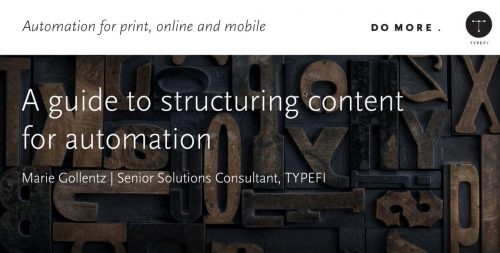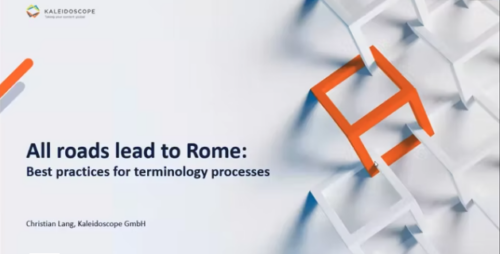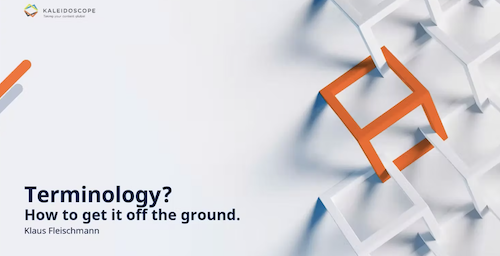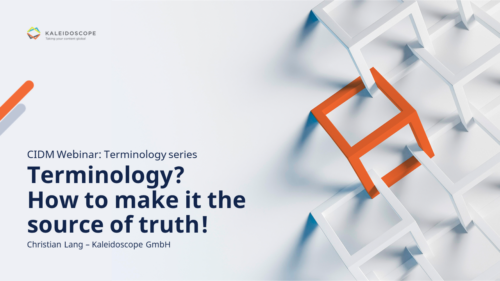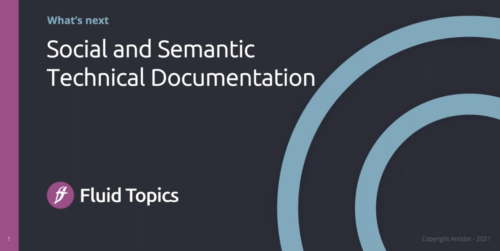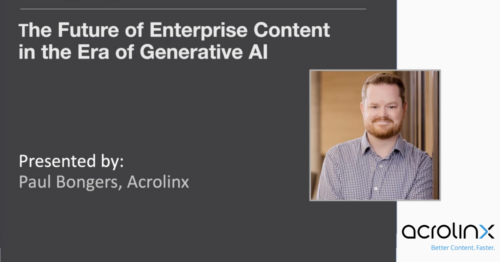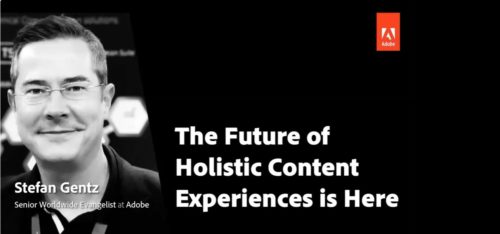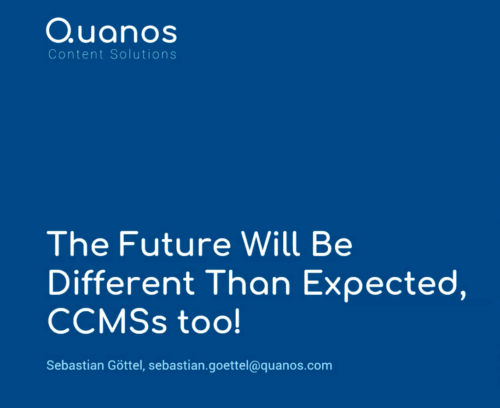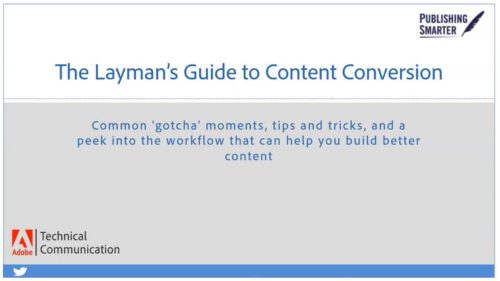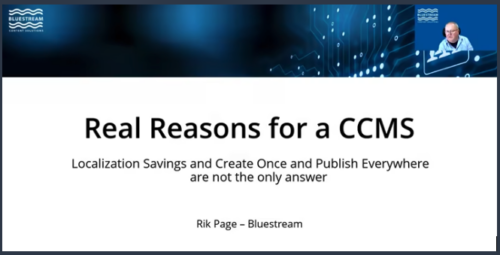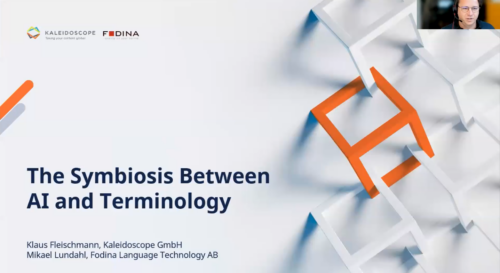-
September 9, 2020 This is a presentation that provides an intersection between content and design. It is a high-level practical guide to analyzing your content, deciding what you want to do with it, developing style naming conventions, and developing editorial style guides, design style guides, and style templates. Once you get to that stage, you can then consider how content management systems, automation, and xml might fit into your publishing processes. Presented by: Marie Gollentz is a Senior Solutions Consultant focusing on the European market. Prior to joining Typefi, she held a number of positions in the publishing industry in London, including at the publisher of Research Fortnight and the London School of Business and Finance. Marie holds a Masters degree in European Political Sciences from the Autonomous University of Barcelona and a Bachelor’s degree in Political Sciences from Sciences Po Strasbourg. She is trilingual in English, French and Spanish.
-
Recorded on December 7, 2023

Communication can be tricky as meaning and understanding can get lost easily. The nuances of our languages with their different meanings and overlapping concepts are only one source for failed communication. On a business level, things get even more complicated when different business units or content providers are not consistent in their usage of words. In the days of “King Content” this can be detrimental to your business success.
- But how do you find out which terms are used in various parts of your organization?
- How can you gather and harmonize them?
- How can you get everybody's input on the suggestions you make as a terminologist?
- And how can you make sure you have a functioning feedback loop to maintain consistently high termbase quality?
Find out more in our webinar where we present procedural and technological solutions with our Content Quality Platform Kalcium.
Presented by Klaus Fleischmann, Kaleidoscope
Klaus Fleischmann studied translation and IT in Vienna, holds an MA in Conference Interpreting from Monterey, California, and a MAS in Technical Communication from Krems, Austria. In 1996, he founded Austria-based Kaleidoscope, a company implementing content, translation, and terminology management processes for internationally active companies. Kaleidoscope develops online collaboration software for enterprise-level terminology workflow, translator query management, in-country review etc., making the translation quality process comprehensible and strategically manageable. In 2007, he became CEO of Austria's leading LSP, Eurocom Translation Services. Always active in the industry, Klaus was voted into the Gala Board of Directors in 2015 and 2017.
-
Recorded: June 9, 2022
 Terminology only works effectively if the organization manages to agree on consistent concepts and terms. But to achieve a company-wide understanding and agreement a well thought out process and regular interaction are needed. While some organizations prefer a systematic process, others react to ad hoc requests, some are happy with a combination of both.
Therefore, we
Terminology only works effectively if the organization manages to agree on consistent concepts and terms. But to achieve a company-wide understanding and agreement a well thought out process and regular interaction are needed. While some organizations prefer a systematic process, others react to ad hoc requests, some are happy with a combination of both.
Therefore, we
- look at the advantages and disadvantages of both approaches and
- share how to set them up in practice
 Christian Lang, Technical Consultant, has a wide range of experience and interests in the language field, proven by his degree in Japanese studies and translation. He first became involved with terminology management as a freelance translator for the European Patent Office. Since then, it has become one of his hobbies, as has research in the field of NLP on topics such as machine translation, automatic term extraction, and concept maps.
Christian Lang, Technical Consultant, has a wide range of experience and interests in the language field, proven by his degree in Japanese studies and translation. He first became involved with terminology management as a freelance translator for the European Patent Office. Since then, it has become one of his hobbies, as has research in the field of NLP on topics such as machine translation, automatic term extraction, and concept maps.
-
Recorded: April 27, 2022
 Presented by Klaus Fleischmann
OK, so we have all understood that terminology is important for content, AI, search engines, consistent naming, etc.
But what do you need to do
Presented by Klaus Fleischmann
OK, so we have all understood that terminology is important for content, AI, search engines, consistent naming, etc.
But what do you need to do
- to launch a professional and scalable terminology process,
- to convince your boss and your peers that your company needs it and
- to get this off the ground quickly and efficiently with the help of modern terminology software?
-
Recorded on September 8, 2022

Does this sound familiar: there is so much data in your organization, and it is not always clear which sources are up to date and really relevant to business decisions? Terminology can act as the single source of truth, breaking up data silos and providing the same information to every employee. But in order to achieve that, terminology needs to get close to the users and find its way into their systems.
We share how
- to implement the "single source of truth” in terminology work
- to connect your systems, e.g., ERP, CMS, PIM, CAT tools, etc.,
- to distribute the information
- to make this information usable for all
Join us for a tour that starts with your relevant data sources and ends with a clear and concise terminology process as a way of making sense and use of this data.
Presented by Christian Lang Christian Lang, Technical Consultant, has a wide range of experience and interests in the language field, proven by his degree in Japanese studies and translation. He first became involved with terminology management as a freelance translator for the European Patent Office. Since then, it has become one of his hobbies, as has research in the field of NLP on topics such as machine translation, automatic term extraction, and concept maps.
Christian Lang, Technical Consultant, has a wide range of experience and interests in the language field, proven by his degree in Japanese studies and translation. He first became involved with terminology management as a freelance translator for the European Patent Office. Since then, it has become one of his hobbies, as has research in the field of NLP on topics such as machine translation, automatic term extraction, and concept maps.
-
Recorded on June 7, 2023
 What’s Next: Social and Semantic Technical Documentation
In most respects, today’s technical documentation works like the good old Web 1.0: one-way publishing of static textual content, written by humans to be read by humans. But in the last 20 years, the Web has experienced two major revolutions, social and semantic, that led to the outstanding developments of Web 2.0 and Web 3.0. Will technical documentation go the same way? Join Fabrice Lacroix, serial entrepreneur, technology pioneer, and founder of Fluid Topics as he explores the principles that transformed the Web, finds out how these concepts can be applied to technical documentation, and get an insight into Tech Doc 2.0 and Tech Doc 3.0.
Presented by Fabrice Lacroix, CEO of Fluid Topics
What’s Next: Social and Semantic Technical Documentation
In most respects, today’s technical documentation works like the good old Web 1.0: one-way publishing of static textual content, written by humans to be read by humans. But in the last 20 years, the Web has experienced two major revolutions, social and semantic, that led to the outstanding developments of Web 2.0 and Web 3.0. Will technical documentation go the same way? Join Fabrice Lacroix, serial entrepreneur, technology pioneer, and founder of Fluid Topics as he explores the principles that transformed the Web, finds out how these concepts can be applied to technical documentation, and get an insight into Tech Doc 2.0 and Tech Doc 3.0.
Presented by Fabrice Lacroix, CEO of Fluid Topics
 Fabrice Lacroix is a serial entrepreneur and a technology pioneer. He has been working for 25 years on the development of innovative solutions around search technology, content enrichment and AI. He is the founder of Fluid Topics, the leading Content Delivery Platform that reinvents how users search, read and interact with technical documentation.
Fabrice Lacroix is a serial entrepreneur and a technology pioneer. He has been working for 25 years on the development of innovative solutions around search technology, content enrichment and AI. He is the founder of Fluid Topics, the leading Content Delivery Platform that reinvents how users search, read and interact with technical documentation. -
Recorded on April 6, 2023

Enterprise companies are adopting AI generative tools to streamline their content operations and improve efficiency. But without proper governance, they may find themselves publishing off-brand, non-compliant, and even offensive content.
In the era of generative AI, companies need content governance more than ever. Join Paul Bongers to take a closer look at ChatGPT, AI, and NLP technologies and discuss their impact. Don’t miss out on this unique opportunity to balance innovation and governance in the digital age.
Come learn:
-
How generative AI works
-
Its opportunities and pitfalls
-
Where it fits in the content supply chain
-
Why it requires content QA and governance
 Paul Bongers is a strategist, technologist, and a SaaS generalist. In his role as VP Strategy, Paul shapes the Acrolinx product strategy. His team works closely with all departments across the business to foster innovation and expand value for Acrolinx customers.
LinkedIn: https://www.linkedin.com/in/pbongers/
Paul Bongers is a strategist, technologist, and a SaaS generalist. In his role as VP Strategy, Paul shapes the Acrolinx product strategy. His team works closely with all departments across the business to foster innovation and expand value for Acrolinx customers.
LinkedIn: https://www.linkedin.com/in/pbongers/
-
-
February 15, 2022 Just putting your technical documentation on your webpage as a PDF for download will not make you a content hero. PDF is a given – a fundamental requirement. However, both business leaders and end customers expect more than just a documentation portal or a well-designed PDF. They want contextually relevant, personalized, consistent, conversational, and scalable content experiences. But how to deliver on this expectation? In this session, Stefan Gentz, Senior Worldwide Evangelist for Technical Communication at Adobe, will share some insights from the recent Adobe-commissioned Forrester study. Forrester surveyed 450 decision-makers on Content Experience Management to understand how global brands deliver relevant and contextual experiences across touchpoints. He will explore the design of positive customer journeys from marketing to technical support and self-service and back to sales – experiences that provide 360° content experience for your customers and handhold them across their whole content journey. Presented by: Stefan’s mission is to inspire enterprises and technical writers around the world and show how to create compelling technical communication content with the Adobe Technical Communication tools. He is also a certified Quality Management Professional (TÜV), ISO 9001 / EN 15038 auditor, ISO 31000 Risk Management expert, and Six Sigma Champion. As a sought-after keynote speaker and moderator at conferences around the world, he travels around the globe half of the year. Besides that, he has been the European Ambassador for the Globalization and Localization Association (GALA) for many years, a member of the tekom Conference Advisory Board for several years, and is now a member of the tekom iiRDS working group for Intelligent Information and member of the OASIS DITA Adoption Committee. In 2016, Stefan Gentz was awarded by MindTouch as one of the Top 25 Leading Content Strategist Influencers in the world and as one of the Top 25 Content Experience Influencers in the world in 2017. Stefan Gentz on LinkedIn Stefan Gentz on XING @stefangentz on Twitter www.adobe.com
-
Recorded on December 15, 2022
 The new 20s have been very turbulent so far, and have shaken many basic beliefs in the industry. It might seem comforting to know that at least Component Content Management Systems still work just as reliably as they did back in 2019, 2014, or 2008... wait. Isn’t it time for a change? Experts agree that even the latest trends like content delivery, ontologies, or the cloud won't bring about the change needed for software to evolve the way technical writers actually use it. If we question our basic assumptions on how a CCMS works, however, we might find some exciting new possibilities.
WHAT YOU'LL LEARN
An industry expert will highlight the megatrends of the 20s and try to draw new conclusions for CCMSs. And no matter where this webinar will lead us, we'll have plenty of material for discussion at the end.
Presented By Sebastian Göttel
The new 20s have been very turbulent so far, and have shaken many basic beliefs in the industry. It might seem comforting to know that at least Component Content Management Systems still work just as reliably as they did back in 2019, 2014, or 2008... wait. Isn’t it time for a change? Experts agree that even the latest trends like content delivery, ontologies, or the cloud won't bring about the change needed for software to evolve the way technical writers actually use it. If we question our basic assumptions on how a CCMS works, however, we might find some exciting new possibilities.
WHAT YOU'LL LEARN
An industry expert will highlight the megatrends of the 20s and try to draw new conclusions for CCMSs. And no matter where this webinar will lead us, we'll have plenty of material for discussion at the end.
Presented By Sebastian Göttel
 Sebastian Göttel is Head of Marketing and Product Management at Quanos Content Solutions GmbH. The computer scientist has been involved with XML editing systems and content delivery since 1998. In the Tekom environment, he worked on version 1.0 of the iiRDS standard. [email protected]
Sebastian Göttel is Head of Marketing and Product Management at Quanos Content Solutions GmbH. The computer scientist has been involved with XML editing systems and content delivery since 1998. In the Tekom environment, he worked on version 1.0 of the iiRDS standard. [email protected]
-
November 11, 2021 Content authors need to consider many factors while converting their existing content to structured content, including analyzing the content at its source. This exercise is interesting yet challenging, vexing, but rewarding. But what are those factors you need to think about for this conversion? For starters, you need to consider:
- Character styles and how they are assigned (Use the style named Emphasis? Press Ctrl+I? Use a toolbar icon? Is there a difference?)
- Paragraph styles and how they are assigned (Did you skip bullet 1 and go right to bullet 2 because it looks better and, if you did, what does it mean?)
- Images and how to import them (Did you copy/paste or use the import setting? If so, how did you import it? As a link to the source?)
- Links between files or the web (Did it just get typed in, or was this inserted using a linking tool? How will it convert?)
- Page layout, tables, design, variables, equations, and so on
-
Recorded on November 3, 2022
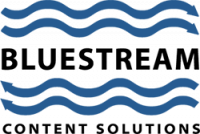 For over fifteen years, teams have tried to justify their need for a move to structured content with the same old arguments. In today’s ever-changing landscape, these old arguments are no longer sufficient and, in many cases, not even relevant. In this webinar, we will be looking at other drivers for the move to structure with real-world examples of what can be achieved.
Presented by Rik Page, Bluestream
For over fifteen years, teams have tried to justify their need for a move to structured content with the same old arguments. In today’s ever-changing landscape, these old arguments are no longer sufficient and, in many cases, not even relevant. In this webinar, we will be looking at other drivers for the move to structure with real-world examples of what can be achieved.
Presented by Rik Page, Bluestream
 Rik has worked with component content and document management solutions for over 20 years. He has worked with custom DTDs and Schemas, S1000D, iSpec2200, and DITA, together with various document and content management systems, including Documentum, SharePoint, XDocs, Ixiasoft, easyDITA, Astoria, and Vasont.
His practical experience ranges from high-volume data capture and content creation to dynamic multichannel delivery in various industries, including banking and finance, manufacturing, central government, and education. In addition, Rik has participated in multiple consultancy projects and helped formulate innovative solutions throughout Europe and North America.
Rik is also an advocate of Documentation 4.0, a new concept reflecting the demands on content/documentation that results from moving to Industry 4.0 and ‘smart’ manufacturing.
Rik has worked with component content and document management solutions for over 20 years. He has worked with custom DTDs and Schemas, S1000D, iSpec2200, and DITA, together with various document and content management systems, including Documentum, SharePoint, XDocs, Ixiasoft, easyDITA, Astoria, and Vasont.
His practical experience ranges from high-volume data capture and content creation to dynamic multichannel delivery in various industries, including banking and finance, manufacturing, central government, and education. In addition, Rik has participated in multiple consultancy projects and helped formulate innovative solutions throughout Europe and North America.
Rik is also an advocate of Documentation 4.0, a new concept reflecting the demands on content/documentation that results from moving to Industry 4.0 and ‘smart’ manufacturing.
-
Recorded on September 14, 2023
 Intelligent terminology retrieval and management with TermCatch and Kalcium Quickterm
A centrally managed and validated termbase forms the basis for consistent and correct company terminology. One of the challenges of managing such a termbase is that terminology is spread across different areas of your company and is constantly being changed and created. In one department, a new Excel list suddenly appears. In others, your terminology runs free in all manner of texts, from technical manuals and marketing brochures to software user interfaces and your own website. But how can you capture this "wild" terminology, tame it, and integrate it into your existing terminology? And how can AI support you in this and other terminology management tasks?
In our webinar we will show you:
Intelligent terminology retrieval and management with TermCatch and Kalcium Quickterm
A centrally managed and validated termbase forms the basis for consistent and correct company terminology. One of the challenges of managing such a termbase is that terminology is spread across different areas of your company and is constantly being changed and created. In one department, a new Excel list suddenly appears. In others, your terminology runs free in all manner of texts, from technical manuals and marketing brochures to software user interfaces and your own website. But how can you capture this "wild" terminology, tame it, and integrate it into your existing terminology? And how can AI support you in this and other terminology management tasks?
In our webinar we will show you:
- Where terminology may be hiding in your company
- How to extract, cluster, harmonize, and validate it
- How to use AI in order to be more efficient in your terminology work
- How the new TermCatch integration for the established terminology management and workflow tool Kalcium Quickterm supports you in this process
 Klaus Fleischmann studied translation and IT in Vienna, holds an MA in Conference Interpreting from Monterey, California, and a MAS in Technical Communication from Krems, Austria. In 1996, he founded Austria-based Kaleidoscope, a company implementing content, translation, and terminology management processes for internationally active companies. Kaleidoscope develops online collaboration software for enterprise-level terminology workflow, translator query management, in-country review etc., making the translation quality process comprehensible and strategically manageable. In 2007, he became CEO of Austria´s leading LSP, Eurocom Translation Services. Always active in the industry, Klaus got voted into the Gala Board of Directors in 2015 and 2017
Klaus Fleischmann studied translation and IT in Vienna, holds an MA in Conference Interpreting from Monterey, California, and a MAS in Technical Communication from Krems, Austria. In 1996, he founded Austria-based Kaleidoscope, a company implementing content, translation, and terminology management processes for internationally active companies. Kaleidoscope develops online collaboration software for enterprise-level terminology workflow, translator query management, in-country review etc., making the translation quality process comprehensible and strategically manageable. In 2007, he became CEO of Austria´s leading LSP, Eurocom Translation Services. Always active in the industry, Klaus got voted into the Gala Board of Directors in 2015 and 2017
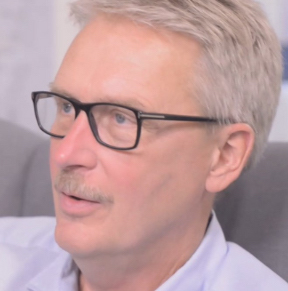 Mikael Lundahl works with language processes and language technology. From content creation to translation and publishing. From marketing material to technical documentation and software strings. His focus is on how terminology, with processes and tools, can support both the writing and translation processes.
Fodina Language Technology partners with and sells products from Kaleidoscope and Acrolinx. But Fodina also develops tools that help customers to build their company terminologies based on existing documentation, standards, or competitor's web information. AI-supported term extraction from many file formats and automated clustering of identified terms into concepts. Through integrations to both Acrolinx and Kaleidoscope products, we have full tool support for the terminology process that we recommend customers to use. Our tools support working with terms in English, German, and Swedish.
Mikael Lundahl works with language processes and language technology. From content creation to translation and publishing. From marketing material to technical documentation and software strings. His focus is on how terminology, with processes and tools, can support both the writing and translation processes.
Fodina Language Technology partners with and sells products from Kaleidoscope and Acrolinx. But Fodina also develops tools that help customers to build their company terminologies based on existing documentation, standards, or competitor's web information. AI-supported term extraction from many file formats and automated clustering of identified terms into concepts. Through integrations to both Acrolinx and Kaleidoscope products, we have full tool support for the terminology process that we recommend customers to use. Our tools support working with terms in English, German, and Swedish.

